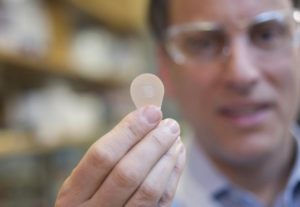What it is and when to jump in for institutional faculty, investigators and researchers with high potential new medical technologies.

Mark Prausnitz, Ph.D., Georgia Tech Regents professor in the School of Chemical and Biomolecular Engineering, holds a microneedle vaccine patch containing needles that dissolve into the skin. (Credit: Christopher Moore, Georgia Tech)
The engineering expertise of Georgia Tech faculty, researchers and students, coupled with the highly robust health tech and healthcare ecosystem in Atlanta breeds novel solutions to unmet clinical needs; Scott Hollister, Omer Inan and W. Hong Yeo come to the front of our minds.
But those solutions, regardless of their origins, need to follow a capital efficient pathway to commercialization. Doing the right things early and following a rigorous phase gated process can substantially increase the likelihood of milestone achievement at any point in a technology’s commercialization pathway.
From our Northyards and 14th Street facilities in Atlanta, GCMI helps verify, validate and accelerate the development and commercialization of new medical technologies that save lives and improve patient care. We help individual clinician innovators, start up companies, engineers and scientists with university supported technologies, large and small medical technology customers including industry partners and health systems.
In medical product development, correctly identifying and committing to your FDA approval process or pathway, for example, can make or break many new projects. It’s not as simple as, “I have an idea,” “I’ve made a prototype”, or “does the device work?” Project success is dependent upon careful planning and consideration across all functional dimensions – regulatory, technological, clinical, commercial, legal, etc.
In a process we define as “Phase Zero,” we ask and answer the following questions to better understand a technology’s development pathway.
- Is there a market for the product? Will someone pay for it?
- How will your device improve outcomes compared to the current standard of care?
- What is the product’s FDA approval pathway?
- Can you protect your technology with Intellectual Property (IP)? Who are your competitors?
- What are the critical design elements, specifications, and user needs that make your device work?
 At the end of Phase Zero, an innovator will better understand what makes their technology function, what makes their concept unique, and what they need to do in a methodical, objective, stepwise manner to get that product through successive “phase gates” into the hands of end-users.
At the end of Phase Zero, an innovator will better understand what makes their technology function, what makes their concept unique, and what they need to do in a methodical, objective, stepwise manner to get that product through successive “phase gates” into the hands of end-users.
Are you an engineer, researcher or faculty member with what you believe could be a promising technology to address an unmet clinical care need? Would you like to know more about Phase Zero to determine whether or not it’s the best next step?
Contact GCMI Director of Scientific Affairs Evan Goldberg via email: evan.goldberg@gcmiatl.com
“At Phase Zero, 6 Things Innovators Need to Know About the FDA Approval Process”
